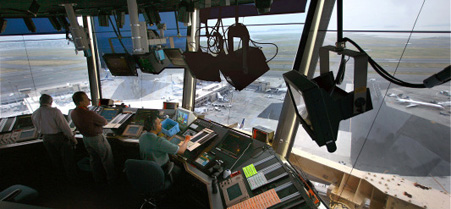FAA awards $4.4 billion for development of NextGen technologies
Contracts will cover improved weather imaging system and 4-D flight tracking.
 The contract covers elements of modernization including weather, communications and navigation systems.
The contract covers elements of modernization including weather, communications and navigation systems.
The Federal Aviation Administration on Wednesday awarded $4.4 billion in industry contracts to support its overhaul of the nation's air traffic control system.
The agency will be working with Boeing Co., General Dynamics and ITT to develop components for NextGen, which replaces the current aviation system with more advanced technology. The awards are part of the $7 billion System Engineering 2020 contract designed to maximize NextGen funding by integrating programs across FAA. SE2020 is the largest set of awards in the agency's history.
"Make no bones about it; we have built the foundation of NextGen capabilities," said FAA Administrator Randy Babbitt in a speech on Wednesday at the agency's technical symposium. "We've created a platform and are committed to continuing what we need to do on the FAA infrastructure side. It's up to industry now to invest in and then capitalize on innovation."
Ed Sayadian, vice president of ITT's air traffic management business unit, said the contract is broad and covers all elements of modernization including weather, communications and navigation systems, as well as automation, operations and procedures. For example, ITT will help manage the migration to trajectory-based operations, which expand current navigational measurements -- latitude, longitude and altitude -- to include a time element. When viewed in four dimensions, aircraft can fly from point to point more directly.
According to Daryl Stephenson, a spokesman for Boeing Research and Technology, the company's $1.7 billion contract award includes feeding up-to-date weather information to airplane flight decks, as well as air traffic management, modeling and simulation.
"It's innovative for the FAA in the sense that they've awarded and looked at industry to partner with them to build equipment and put systems in place, which they've been doing, but also to help formulate concepts and do some of the research and test out and assess different technologies," said Sayadian. ITT's award has a $1.4 billion ceiling over 10 years.
Babbitt also announced the impending launch of the NextGen Integration and Evaluation Capability lab, which will use airport and cockpit simulations to research how human factors affect new technologies. Automation is important, but an overreliance on technology can lead to inattention, he said, noting the lab's research will be the "acid test" for NextGen programs.
"NextGen is the sum total of a whole lot of moving parts, moving parts that are moving very quickly," Babbitt said. "Candidly, they're moving, they're moving in the right direction, and they're serving as a reminder that we need to move along with them. We've got the tools. We've got the foundation. The future of NextGen, and of U.S. aviation itself, depends on when, where and how we use them."
NEXT STORY: Final Honors for Forgotten Vets





